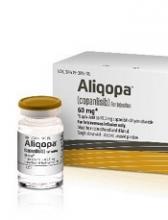The US Food and Drug Administration (FDA) has granted accelerated approval to copanlisib (Aliqopa), an intravenous PI3K inhibitor developed by Bayer.
The drug is now approved to treat adults with relapsed follicular lymphoma (FL) who have received at least 2 prior systemic therapies.
Copanlisib received accelerated approval from the FDA because it has not yet shown a clinical benefit in these patients.
The FDA’s accelerated approval program allows conditional approval of a drug that fills an unmet medical need for a serious condition.
Accelerated approval is based on a surrogate or intermediate endpoint—in this case, overall response rate—that is reasonably likely to predict clinical benefit.
Continued approval of copanlisib for the aforementioned indication may be contingent upon verification of clinical benefit in confirmatory trials.
The FDA previously granted copanlisib priority review, fast track designation, and orphan drug designation.
According to Bayer, copanlisib is now available. The prescribing information is available for download here.
In addition, Bayer has created the Aliqopa™ Resource Connections (ARCTM) Program, which includes resources to help patients navigate the insurance process and identify sources of financial assistance.
The program offers free medication to patients who are uninsured or underinsured and meet the eligibility criteria. It includes a $0 co-pay program for covered patients.
Phase 2 results
The FDA’s approval of copanlisib is based on data from the phase 2 CHRONOS-1 trial. Data from this trial were presented at the AACR Annual Meeting 2017 and the 2017 ASCO Annual Meeting.
The trial included 104 patients with FL who had relapsed after at least 2 prior systemic therapies.
The median duration of treatment with copanlisib was 22 weeks (range, 1-105). Thirty-three patients (32%) were still on treatment at last follow-up.
The overall response rate was 59%, with 14% of patients achieving a complete response. The median duration of response was 12.2 months (range, 0+ to 22.6).
The most common treatment-emergent adverse events (in ≥25% of patients) were diarrhea (34% all grades, 5% ≥grade 3), reduced neutrophil count (30% all grades, 24% ≥grade 3), fatigue (30% all grades, 2% ≥grade 3), and fever (25% all grades, 4% ≥grade 3).
There were 6 deaths, and 3 of them were attributed to copanlisib. One patient died of lung infection, 1 died of respiratory failure, and 1 died of a thromboembolic event.


